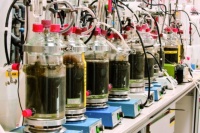The use of sustainable raw materials is the focus of the new research programme bio-economy for which the Baden-Württemberg State Government is making 13 million Euros available. Of the total of 45 research projects recommended for funding, 11 projects already approved are established at seven institutes at the University of Stuttgart; these have a volume of two million Euros. Prof. Thomas Hirth, Head of the Institute of Interfacial Engineering and Plasma Technology (IGVP) at the University of Stuttgart and the Fraunhofer-Institute for Interfacial Engineering and Biotechnology (IGB) has been appointed as the spokesperson of the steering group.

The quintessence of the research strategy is to observe the bio-economy in the value added cycles and as a total system. In so doing social, economic and political framework conditions in using renewable raw materials as well as the effects on the environment and society should be taken into account in equal measure. On the supply side agricultural and plant science, forestry, aquatic biomass as well as biogenic residue were identified as the most important research fields. On the demand side resp. utilisation side the food production as well as in the follow-up a material or energetic use of residues are the focus. Cross-sectional areas were stated as being biodiversity, water and soil conservation, ethics as well as economic and social sciences.
The main component of the research programme bio-economy refers to three interdisciplinary and cross-locational associations:
- The research association “Sustainable and flexible value-added chains for biogas in Baden-Württemberg“, combines the biogas competences in the state. It forms the entire value added chain of biogas production and its product use and investigates in particular the recycling of waste materials. Seven of the sub-projects established at the University of Stuttgart fall into this field. Among other things they deal with the performance increase of biogas systems, the development of new biomass sources, for example, from waste materials and sewage sludge as well as with the appropriate storage of biogas.
- The research association “Lignocellulose – changing to an alternative raw material platform for new projects and materials“ targets the holistic use of woody biomass (wood, straw, etc.) to manufacture chemical products and energy sources. The two products at the University of Stuttgart focus on treatment methods to extract such materials in premium quality as well as fermentation processes to manufacture so-called bulk chemicals and fuels.
- The research association “Integrated use of microalgae for nutrition“ wishes to extend the range of use of microalgae for the food and animal feed sector. Microalgae are able to form up to five times more biomass per area than classic energy crops and do not require any valuable arable land. In this association two sub-projects at the University of Stuttgart deal with regional land utilisation and biodiversity aspects as well as with the harmonisation of lifecycle assessments for bio-based products.
Along with the Universities of Hohenheim, Stuttgart, Freiburg, Heidelberg and Ulm, the Karlsruhe Institute for Technology (KIT) as well as the Deutsche Verein des Gas- und Wasserfaches e. V. (German Association for gas and water applications), the Forstliche Versuchs- und Forschungsanstalt BW (Forest Research Institute), the Fraunhofer Institute for Chemical Technology and the Centre for European Economic Research are involved. The projects are to be presented in the framework of the 1 st Baden-Württemberg Bioeconomy Congress on 29th and 30 th October 2014 in Haus der Wirtschaft in Stuttgart.
Contacts
Prof. Thomas Hirth
Institute for Interfacial Engineering and Plasma Technology at the University of Stuttgart and Fraunhofer-Institute for Interfacial Engineering and Biotechnology IGB
Tel. 0711-970-4400
Email: thomas.hirth@igb.fraunhofer.de
Andrea Mayer-Grenu
University of Stuttgart, Department of University Communication
Tel. 0711-685-82176
Email: andrea.mayer-grenu@hkom.uni-stuttgart.de
Source
University of Stuttgart, press release, 2014-08-18.
Supplier
Deutsche Vereinigung des Gas- und Wasserfaches (DVGW)
Forstliche Versuchsanstalt Baden-Württemberg (FVA)
Fraunhofer-Institut für Chemische Technologie (ICT)
Fraunhofer-Institut für Grenzflächen- und Bioverfahrenstechnik (IGB)
Karlsruher Institut für Technologie (KIT)
Landesregierung Baden-Württemberg
Universität Freiburg
Universität Hohenheim
Universität Stuttgart
Universität Ulm
Zentrum für Europäische Wirtschaftsforschung GmbH (ZEW)
Share
Renewable Carbon News – Daily Newsletter
Subscribe to our daily email newsletter – the world's leading newsletter on renewable materials and chemicals









